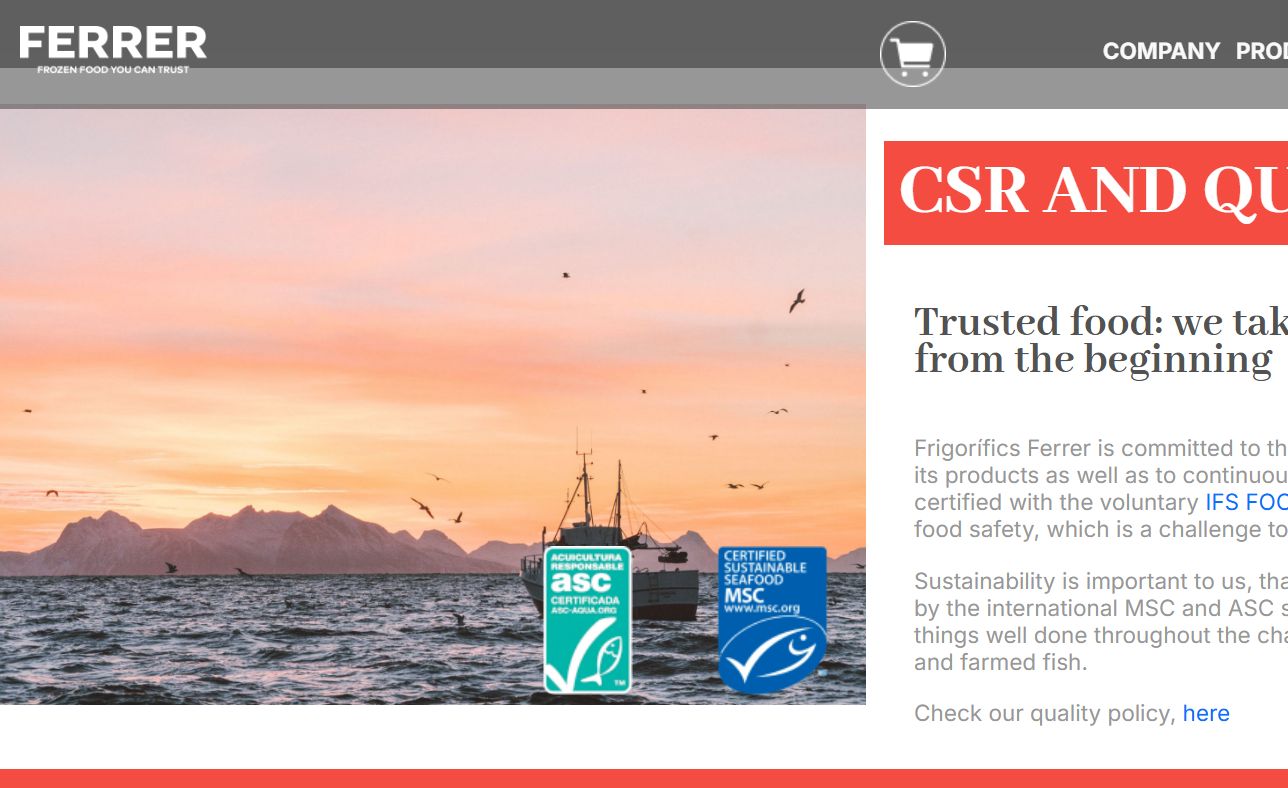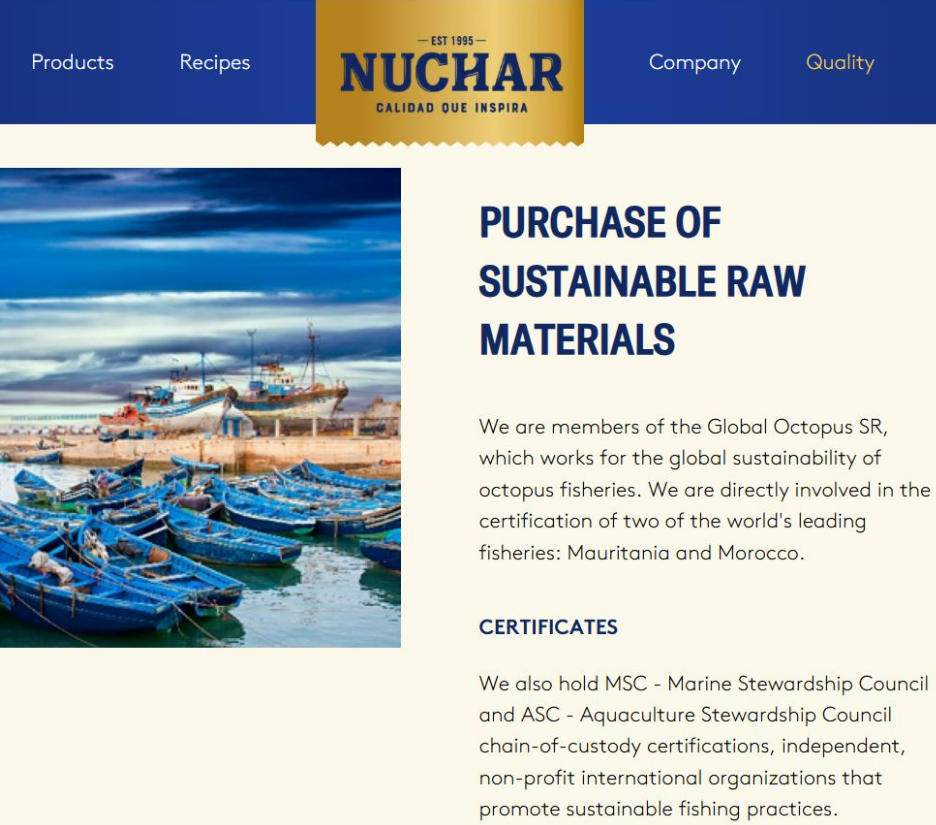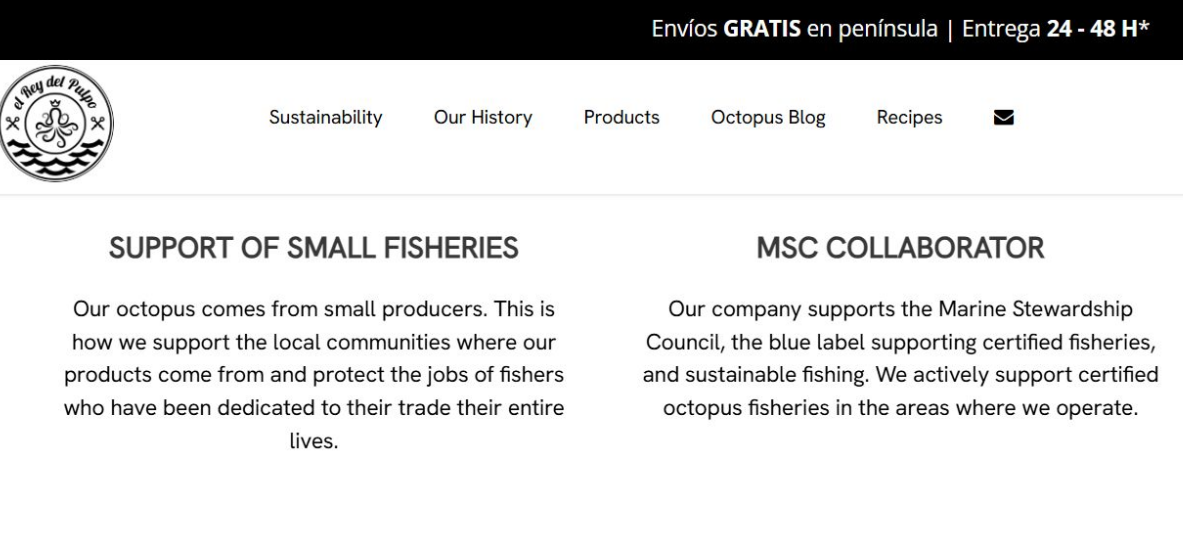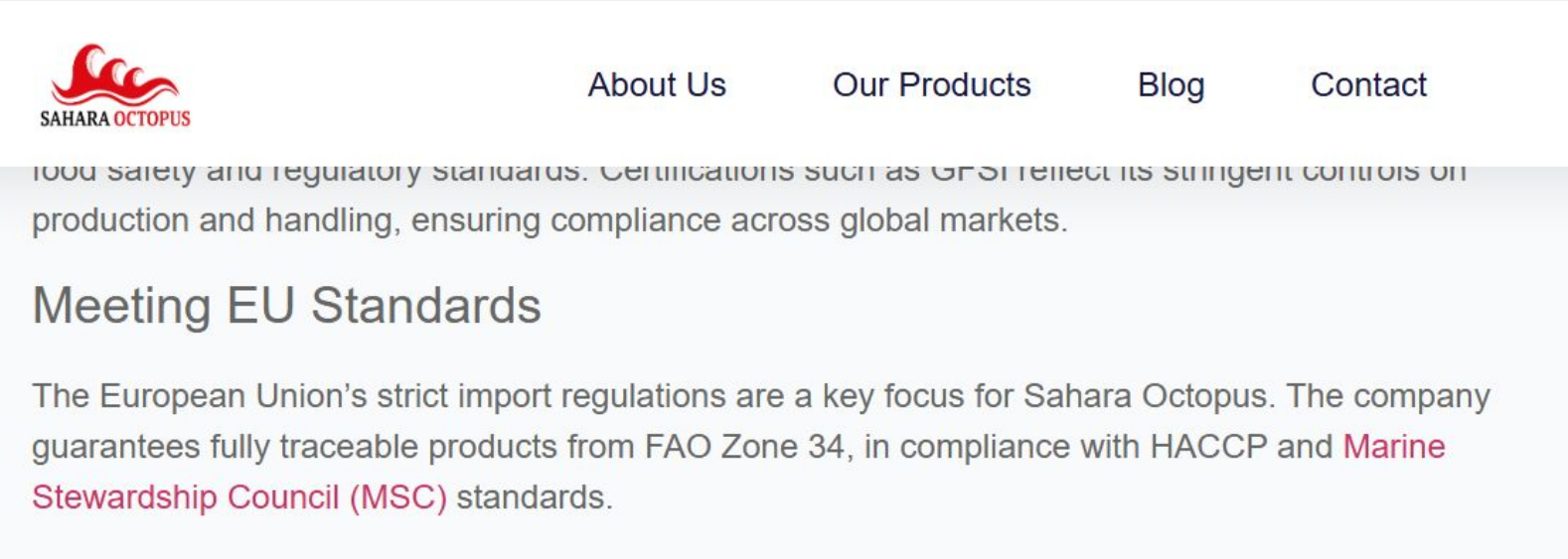
The certification scheme MSC guarantees that no fisheries in Western Sahara are certified. But Spanish food distributors give another impression.
The Marine Stewardship Council (MSC), one of the world’s leading certification schemes for sustainable fisheries, has confirmed that it has not certified any fisheries in Moroccan, Mauritanian, or Western Saharan waters. Consequently, no product carrying MSC’s Chain of Custody certification can originate from these areas. This was stated in a letter from MSC to Western Sahara Resource Watch (WSRW).
Nevertheless, Spanish fish distributors repeatedly invoke the MSC name and label to legitimize their trade in products from Western Sahara. Some claim to be in the process of certification, while others present themselves as “supporting” or “collaborating” with MSC. In reality, they are free riders: their contentious purchases from the Moroccan fishing industry in occupied Western Sahara have no link to MSC certification, yet their marketing deliberately suggests otherwise.
This practice risks misleading consumers.
The MSC Chain of Custody certification applies strictly to the product and its production process, with a particular focus on maintaining healthy fish stocks and reducing environmental impacts. “The MSC’s Global Licensing team monitors label and trademark use, and any application of the label requires product-level approval,” MSC stated in its comments to WSRW.
MSC does not, however, evaluate a company’s conduct beyond the certified product line. It does not assess a company's human rights practices, environmental harms tied to other operations, or the company’s behavior elsewhere in its supply chain.
In this way, European companies exploit the MSC brand tied to a single certified product to cast a favorable light over their entire operations or product portfolio - thereby legitimizing practices that conflict with EU law and fundamental standards of corporate responsibility.
Check out the examples below.
FERRER
In 2025 - several months after the CJEU rulings of 4 October 2024 on Western Sahara fisheries and proper country-of-origin labeling - the Spanish distributor Ferrer marketed [or download] octopus from occupied Western Sahara as “Moroccan,” in direct violation of the Court’s decision. In the same document, Ferrer asserted that it “is audited every year to ensure compliance with the MSC and ASC Chain of Custody standards, which guarantee the traceability of products from the sea and/or farm to the consumer.” On its website, the company went further, stating: “Sustainability is important to us, that is why we are certified as a chain of custody by the international MSC and ASC seals that protect, watch over and identify things well done throughout the chain at a sustainable level of both wild product and farmed fish.”
What Ferrer does not disclose is that MSC/ASC certification applies only to a limited part of its product portfolio - not to the controversial octopus trade from Western Sahara.
This is misleading, as it suggests that certification covers all of Ferrer’s products from sea to consumer. In reality, it does not. The audits apply only to the specific segments of Ferrer’s operations that handle MSC- and ASC-certified products. They are not company-wide assessments of Ferrer’s overall activities, ethics, or full product portfolio.
The MSC Chain of Custody standards have no bearing on Ferrer’s fraudulently mislabeled octopus products, which are sourced through Morocco’s unlawful fishing industry in the occupied territory and exported in violation of the Saharawi people’s rights.
Ferrer repeated [or download] the same misleading claims in its 2024 Christmas catalogue. WSRW wrote to the company on 25 June 2025 but received no response.
NUCHAR

On its website [or download], under the heading “Purchase of Sustainable Raw Materials,” the Spanish company Nuchar claims to be “directly involved in the certification of two of the world’s leading fisheries: Mauritania and Morocco.” The company markets a wide range of octopus products but makes no reference to Western Sahara, where its octopus is most likely sourced. One of Nuchar’s resellers even lists [or download] Dakhla as the product’s origin.
Nuchar further asserts: “We know how important it is to protect the seas and oceans to maintain healthy marine ecosystems and ensure the future of sustainable fishing, which is why we are MSC certified.” Yet the meaning of “we are MSC certified” remains unclear. As noted, MSC does not certify companies as a whole, but only specific products that meet its standards. By claiming otherwise, Nuchar creates the false impression that the entire company - or all of its products - are covered. In reality, Nuchar does not appear in MSC’s official registry.
WSRW contacted MSC to clarify whether Nuchar holds any certification but received no response. The same inquiry was sent to Nuchar, which also did not reply.
DISCEFA

The Galician company Discefa sources its octopus from Dakhla. On the website [or download] of one of its brands, El Rey del Pulpo, the octopus is erroneously labeled as originating from “Morocco.” Adjacent to this claim, a Discefa video depicts octopus fisheries in Western Sahara. The site also states: “MSC COLLABORATOR. Our company supports the Marine Stewardship Council, the blue label supporting certified fisheries, and sustainable fishing. We actively support certified octopus fisheries in the areas where we operate.”
This creates the impression that MSC certifies the octopus fisheries supplying the product, including those in Western Sahara. In fact, MSC has explicitly confirmed that it certifies “no Moroccan or Mauritanian fisheries.” The meaning of Discefa’s self-designation as an “MSC Collaborator” is unclear, as MSC does seemingly not define or endorse this term, making it potentially misleading.
The company further claims [or download] that “Discefa joined the Marine Stewardship Council (MSC) to protect ocean life,” with similar references appearing elsewhere on its website. Such wording gives the false impression that MSC endorses or approves Discefa’s overall operations.
While Discefa’s octopus processing is covered by an MSC Chain of Custody certificate, the MSC registry does not indicate the waters from which the octopus originates. As there are no MSC-certified fisheries in Western Sahara, the product must come from elsewhere.
WSRW contacted MSC to ask whether it would request changes to the El Rey del Pulpo website but received no response. Similar inquiries to Discefa and El Rey del Pulpo, also went unanswered.
3 DE PULPO
The Spanish importer 3 de Pulpo states on its website [or download and download] that it sources “Dakhla Octopus, fished and frozen daily using artisanal techniques,” describing it as “the most prestigious Moroccan variant of octopus worldwide.” It further claims that the octopus is caught “in Morocco.”
By marketing octopus from Western Sahara as Moroccan, 3 de Pulpo is in violation of the EU Court of Justice ruling of 4 October 2024.
The company adds [or download] : “We are concerned about strict compliance with international food standards. (...) We are currently in the process of certification according to IFS, BRC and MSC regulations, to guarantee quality, traceability and sustainability.”
However, 3 de Pulpo does not hold MSC certification for its trade involving Western Sahara. Whether a certification process is actually underway is unclear. WSRW contacted MSC to clarify the matter but received no response. A WSRW letter sent to 3 de Pulpo also went unanswered.

UNIMER
For several years, the Moroccan company Unimer Group has emphasized in its annual ESG reports [or download] that it is “continuing its commitment to the sustainability of Moroccan fisheries with the goal of obtaining MSC (Marine Stewardship Council) certification for sardine and anchovy fisheries”. However, it remains unclear what concrete steps, if any, Unimer is taking to achieve this goal.
Seventeen years have passed since Moroccan fisheries first attempted to meet MSC sustainability standards through a so-called Fisheries Improvement Project. Yet Unimer continues to frame its “commitment” largely on the basis of those early efforts, initiated in 2008.
In its 2024 ESG report [or download], Unimer proudly claims to hold MSC certification for the canning of sardines and mackerel. WSRW, however, has been unable to verify this. The only certification WSRW could confirm is for Unimer’s processing of sardines sourced from Argentina; no other Unimer certifications appear in MSC's public registry.
WSRW contacted Unimer for clarification but did not obtain a response
In December 2024, a Unimer cargo of fishmeal from Morocco was raided by Moroccan police for concealing a 3.6-ton shipment of cannabis bound for Belgium.
SAHARA OCTOPUS

The Moroccan exporter Sahara Octopus claims on its website to operate “in compliance with […] Marine Stewardship Council (MSC) standards.” However, the statement is unclear, as the as the product it appears to exclusively market cannot logically be MSC certified, as MSC does not certify fisheries in Western Sahara. WSRW contacted Sahara Octopus for clarification but received no response.
Unclarities
So, what is MSC doing to address this “MSC-washing” of products entering the EU market originating from Morocco’s illegal fisheries operations in Western Sahara waters? WSRW contacted MSC on 29 November 2024, 25 December 2024 and again on 13 June 2025. Responses were sent from MSC to WSRW on 13 December 2024 and 3 July 2025.
To date, it remains unclear what measures MSC is taking to prevent Spanish distributors from misusing its label to whitewash their controversial trade in products sourced from Western Sahara.
WSRW asked MSC how it assesses the risk that granting a certificate for a company’s operations in- or imports from- Location A could be used to normalize or whitewash unsustainable practices by the same company in or from Location B. MSC did not respond directly but stated: “The MSC's Global Licensing team monitor label and trademark use, and everything using the label requires approval at a product level [WSRW’s emphasis]. This helps to prevent mislabelling and to ensure integrity. The team would also investigate if the label were used incorrectly.”
MSC did not respond to most questions regarding the above-mentioned companies using its name while simultaneously trading in products from Western Sahara.
Following the CJEU ruling, which found EU-Moroccan fisheries practices to violate the Saharawi people’s rights, the Moroccan industry has sought alternative ways to continue its activities despite international law. An article in the Moroccan newspaper Les Éco [or download], published on 23 October 2024, reported that the Moroccan fish industry association COMAIP is actively exploring new approaches to maintain fisheries operations. Translation by WSRW: “Another notable initiative is the sector's commitment to obtaining Marine Stewardship Council (MSC) certification, ensuring sustainable fishing. This certification, although challenging to achieve, could ‘open new international markets’ and reassure European partners, who are increasingly attentive to environmental concerns.” MSC did not respond to WSRW’s inquiry regarding any engagement with COMAIP on certification efforts following the CJEU ruling.
MSC did comment on one company: the Andorran firm Congelats del Nord, which describes its octopus imports as coming from “Dakhla, Morocco,” a misrepresentation repeated throughout its website [or download]. The company also claims to operate its own processing facility in Dakhla.
On the same page, Congelats del Nord stated: “We are part of a Fishery Improvement Project with the MSC (Marine Stewardship Council) to further provide sustainability options to the fishing industry.” MSC confirmed to WSRW that this was inaccurate: “We can find no record of Congelats del Nord listed as a FIP, as an MSC certified fishery, or with MSC Chain of Custody certification. We have written to them querying the reference to MSC on their website.
By 25 December 2024, the website was revised to read: “We are part of Fishery Improvement projects, working towards Marine Stewardship Council Standards, to further provide sustainability options to the fishing industry.” The change did little to address the issue, and the false statement about the origin of the controversial octopus remained.
WSRW asked whether MSC, given its non-political mandate, would consider contacting Congelats del Nord again to clarify that MSC’s name should not be used in a context that misleads clients by falsely stating an incorrect country of origin. MSC did not respond.
The Congelats del Nord case mirrors the misleading reference to the BAP certificate scheme made by Skretting Turkey, which has promoted its Turkish factory as certified while relying on fishmeal sourced from the occupied territory.
MSC sets two standards: the Fisheries Standard, which establishes environmental requirements fisheries must meet to be certified, and the Chain of Custody Standard, which ensures that only seafood from certified fisheries carries the MSC blue label. Both standards come with searchable registries for verification. See the company register for the supply chain standard and the fisheries standard.
MSC publicly emphasizes its commitment to preventing food fraud, which includes misrepresenting a product’s country of origin. However, it remains unclear to WSRW whether systematic misrepresentation by a partner disqualifies a company from obtaining MSC certification for its other products.
Since you're here....
WSRW’s work is being read and used more than ever. We work totally independently and to a large extent voluntarily. Our work takes time, dedication and diligence. But we do it because we believe it matters – and we hope you do too. We look for more monthly donors to support our work. If you'd like to contribute to our work – 3€, 5€, 8€ monthly… what you can spare – the future of WSRW would be much more secure. You can set up a monthly donation to WSRW quickly here.
Spanish fish processor left Western Sahara
Here are the vessels that violated international law
Buying stolen goods is stealing: the Musical
See this great footage of the first ever flashmob musical against the plundering of Western Sahara, in Mercadona-supermarkets across Spain. Mercadona sells canned fish originating from occupied Western Sahara, under their store brand ‘Hacendado’.
New report: Western Sahara phosphate trade halved
The export of phosphate rock from occupied Western Sahara has never been lower than in 2019. This is revealed in the new WSRW report P for Plunder, published today.


